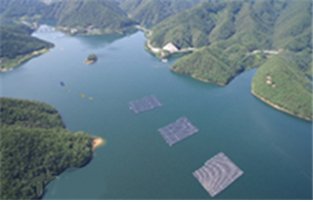 |
Floating Solar Panels (Ministry of Envrionment) |
Korea will see a twofold increase of renewable energy production at environmental facilities within five years, the Ministry of Environment said Tuesday while announcing its renewable energy expansion road map.
The ministry shared its plan to expand renewable energy production at environmental facilities, setting an annual production goal of 5,764 gigawatt-hours by 2026. The goal currently stands at 3,264 GWh per year as of 2021. Environmental facilities refer to those dealing with waste and natural resources ranging from sewage plants to dams.
The ministry also aims to reach energy self-sufficiency with an annual production of 8,726 GWh by 2030. The facilities would be able to produce more energy than they consume.
“We should move toward a future where every building and all infrastructure can create energy for themselves,” said Oh Yeong-min, head of the taskforce team for renewable energy at the ministry.
There are currently 1,341 environmental facilities across Korea, including biogas production facilities which generate energy through waste resources such as food waste, wastewater treatment plants, dams and more.
Though the facilities generate 3,264 GWh worth of renewable energy per year, they are categorized as establishments that consume high energy, as they consume about 7,625 GWh per year in total.
The ministry said it will increase the energy production efficiency of the facilities to nearly double their energy production.
More than 90 percent of organic waste resources such as food and livestock waste and sewage sludge are processed into animal feed or compost, according to the ministry.
It also plans to increase the efficiency of generating energy from organic waste resources, as biogas is an important sustainable energy asset. The ministry aims to increase the number of biogas production facilities from 110 to 140, boosting biogas production by nearly 150 percent.
The ministry deems biogas a suitable substitute for city gas consumption, which will eventually lead to an overall reduction of greenhouse gases.
As there are also private businesses interested in generating green hydrogen energy from biomethane -- a type of biogas -- the ministry will work to support these businesses, increasing the number of biomethane production facilities in Korea from two to five.
The ministry will also invest in water management environmental facilities so that they become self-sufficient energy establishments, offsetting Korea’s carbon production.
By Im Eun-byel (
silverstar@heraldcorp.com)








